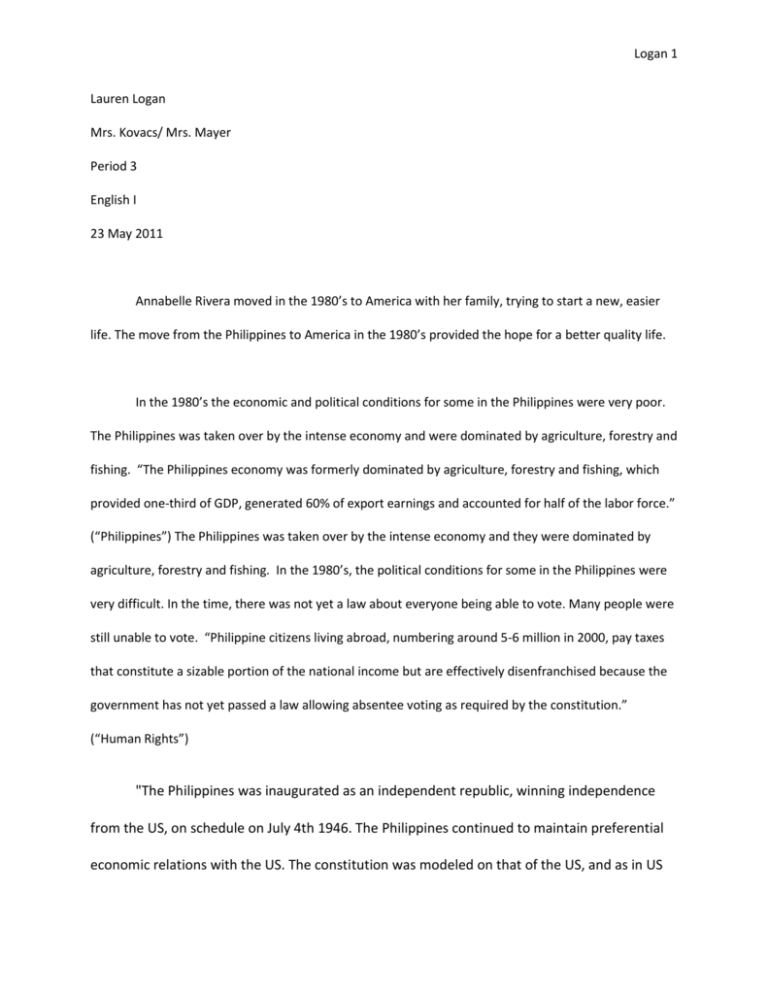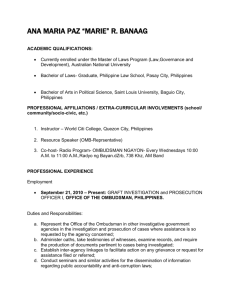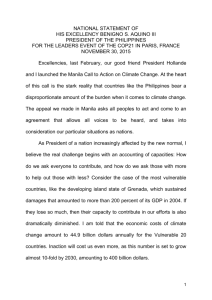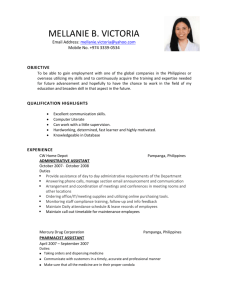Logan Lauren Logan Mrs. Kovacs/ Mrs. Mayer Period 3 English I 23
advertisement

Logan 1 Lauren Logan Mrs. Kovacs/ Mrs. Mayer Period 3 English I 23 May 2011 Annabelle Rivera moved in the 1980’s to America with her family, trying to start a new, easier life. The move from the Philippines to America in the 1980’s provided the hope for a better quality life. In the 1980’s the economic and political conditions for some in the Philippines were very poor. The Philippines was taken over by the intense economy and were dominated by agriculture, forestry and fishing. “The Philippines economy was formerly dominated by agriculture, forestry and fishing, which provided one-third of GDP, generated 60% of export earnings and accounted for half of the labor force.” (“Philippines”) The Philippines was taken over by the intense economy and they were dominated by agriculture, forestry and fishing. In the 1980’s, the political conditions for some in the Philippines were very difficult. In the time, there was not yet a law about everyone being able to vote. Many people were still unable to vote. “Philippine citizens living abroad, numbering around 5-6 million in 2000, pay taxes that constitute a sizable portion of the national income but are effectively disenfranchised because the government has not yet passed a law allowing absentee voting as required by the constitution.” (“Human Rights”) "The Philippines was inaugurated as an independent republic, winning independence from the US, on schedule on July 4th 1946. The Philippines continued to maintain preferential economic relations with the US. The constitution was modeled on that of the US, and as in US Logan 2 politics, power tended to alternate between two parties, the Nationalists and the Liberals. This fairly peaceful rotation of power was interrupted in September 1972, as the president, Ferdinand Marcos, neared the end of his second and final term." (“Politics: Political Background”) The Philippines had won independence from the US on Jul y 4, 1946. The constitution was modelled that the power tended to alternate between two parties, the Nationalists and the Liberals. This peaceful distribution of power was interrupted as the president neared the end of his second and final term. The Philippines and America are very different in many ways. From the education, to the human rights, these two places were very unlike each other. In America, our educational system is; Preschool from 3 to 4, elementary school for 6 years, middle school for 3 years, high school for 4 years, and college (which is optional) for 4 or more years. In the Philippines “The educational system is divided into four stages: preschool (from the age of three), elementary school (lasting six years), secondary or high school (four years) and higher education (normally four years).” (“Philippines”). The difference in these two school systems is that in the Philippines there’s no middle school, which is very important to the American culture. If we went from elementary school to high school we would be missing very vital information in our lives. "In 1998, then-President Joseph Estrada (b. 1937) reintroduced the death penalty, despite strong opposition from human-rights organizations. In 2000, the death penalty was suspended in observance of the Catholic Church's Jubilee Year. Of the roughly 1,500 people due to be executed, most came from the poorest sectors of society and could not afford the Logan 3 services of legal counsel. There is a move in the Philippine Senate to abolish the death penalty. The House appears to be divided on the issue, but President Gloria Macapagal-Arroyo (b. 1947) and the powerful Roman Catholic Church support the Senate move to review the controversial legislation." (“Human rights- Philippines”) In the Philippines, the death penalty was suspended in 1998 while in America it was suspended in 1972. It was suspended because of the complaints from the Catholic Church's Jubilee Year. When this penalty was still around, about 1,500 people got killed which were mostly the people who not afford the services of legal counsel.



